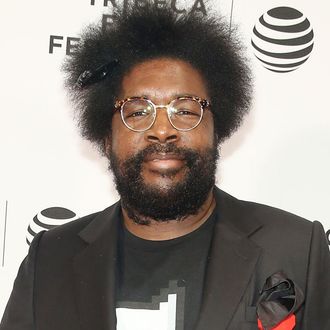
In a new Rolling Stone essay, Questlove recalls the potent influence the late Prince had — and continues to have — on his career. “I patterned everything in my life after Prince,” he writes, alluding to his childhood. “Unknown to me then, but not unseen or unheard, thanks to magazines, TV, radio, and my secret stash — [Prince] was a guide to me in every way.” The drummer goes on to detail the importance of the Purple One’s tastes, his relationship to hip-hop, and his role as a motivator. (Quest also shares a solid anecdote.) Read on for the highlights:
On Prince’s Tastes
I studied his fashion, I studied his affect. I studied his taste in women — carefully. And he began to mentor me in musical matters, too. I wouldn’t have started listening to Joni Mitchell without him. And that led me to Jaco Pastorius, who led me to Wayne Shorter, who led me to Miles Davis. I had a simple rule: if Prince listened to it, I listened to it.
Prince and Hip-Hop
Think of 1999 again — or rather 1982. It was such a banner year for the use of drum machines, from Arthur Baker to Afrika Bambaataa. Prince’s programming work on 1999 was beyond anything I had ever heard, just as innovative as the best hip-hop producers in the years to come: the Bomb Squad, DJ Premier, Pete Rock, Dr. Dre, A Tribe Called Quest, J Dilla. … Prince was an outlaw. When he was giving interviews on the regular to Cynthia Horner in Right On! magazine, he was telling tall tales left and right. That was hip-hop. He built a crew, a posse, around his look and his sense of style. That was hip-hop. He had beef (with Rick James). He had his own vanity label (Paisley Park). He had parents up in arms over the content of his songs to the point where they had to invent the Parental Advisory warning. Hip-hop, hip-hop, hip-hop.
On Always Feeling Like a Fan, Never a Peer
I remember once I was at Paisley Park. By this time, Prince was a Jehovah’s Witness, and he didn’t stand for cursing. I slipped up. It wasn’t anything too major. I think I said “shit.” Prince had a curse jar; every curse cost a dollar. “But you’re rich,” he said. “Put in $20.” “Hey,” I said. “You taught me how to curse when I was little.” … I thought I saw Prince wince a little bit, too, and I walked away wondering if I just confirmed to him that he was justified in taking a hard line. Maybe he actually felt bad that he had turned a generation of kids toward foul language and impure thoughts. I hope not. I was just trying to get out of paying a fine that was justified, for cursing that was probably justified, learned from music that will forever be justified.
The Prince Work Ethic
Much of my motivation for waking up at 5 a.m. to work — and sometimes going to bed at 5 a.m. after work — came from him. Whenever it seemed like too steep a climb, I reminded myself that Prince did it, so I had to also. It was the only way to achieve that level of greatness (which was, of course, impossible, but that’s aspirational thinking for ya). For the last twenty years, whenever I was up at five in the morning, I knew that Prince was up too, somewhere, in a sense sharing a workspace with me. For the last few days, 5 a.m. has felt different. It’s just a lonely hour now, a cold time before the sun comes up.
Catch the whole piece, which also includes bits about James Brown and Purple Rain, here.

